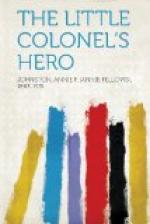Mr. Sherman took the letter and began to read. In two places he corrected a misspelled word, and here and there supplied missing commas and quotation marks. There was a gratified smile on his face when he finished. “That is certainly a lengthy letter for a twelve-year-old girl to write,” he said, in a pleased tone, “and cannot fail to be interesting to Joyce. The letters she wrote me from the Cuckoo’s Nest were stiff, short scrawls compared to this. I must tell my Little Colonel how proud I am of her improvement.”
His words of praise were not spoken, however. He expressed his appreciation, later, by leaving on her table a box of foreign correspondence paper. It was of the best quality he could find in Tours, and to Lloyd’s delight the monogram engraved on it was even prettier than Eugenia’s.
“Why did Papa Jack write this on the first sheet in the box, mothah?” she asked, coming to her with a sentence written in her father’s big, businesslike hand: ’There is no surer way to build a Road of the Loving Heart in the memory of absent friends, than to bridge the space between with the cheer and sympathy and good-will of friendly letters.’
“Why did Papa Jack write that?” she repeated.
“Because he saw your last letter to Joyce, and was so pleased with the improvement you have made,” answered Mrs. Sherman. “He has given you a good text for your writing-desk.”
“I’ll paste it in the top,” said Lloyd. “Then I can’t lose it.” “’There is no surer way,’” she repeated to herself as she carried the box back to her room, “’to bridge the space between ... with the cheer and sympathy and good-will.’”
There flashed across her mind the thought of some one who needed cheer and sympathy far more than Joyce did, and who would welcome a friendly letter from her with its foreign stamp, as eagerly as if it were some real treasure. Jessie Nolan was the girl she thought of, an invalid with a crippled spine, to whom the dull days in her wheeled chair by the window seemed endless, and who had so little to brighten her monotonous life.
“I’ll write her a note this minute,” thought Lloyd, with a warm glow in her heart. “I’ll describe some of the sights we have seen, and send her that fo’ leafed clovah that I found at the chateau yestahday, undah a window of the great hall where Anne of Brittany was married ovah fo’ hundred yeahs ago. I don’t suppose Jessie gets a lettah once a yeah.”
When that note was written, Lloyd thought of Mom Beck and the pride that would shine in the face of her old black nurse if she should receive a letter from Europe, and how proudly it would be carried around and displayed to all the coloured people in the Valley. So with the kindly impulse of her father’s text still upon her, she dashed off a note to her, telling her of some of her visits to the palaces of bygone kings and queens.
Eugenia came in as she finished, but before she closed her desk she jotted two names on a slip of paper. Mrs. Waters’s was one. She was a little old Englishwoman, who did fine laundry work in the Valley, and who was always talking about the ‘awthorne’ edges in her old English home.




